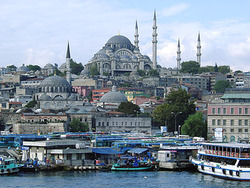- Latest edition January 22nd: Two deals open 2026 ABS market
- Latest edition January 8th: Outlook
- Latest edition December 11th: Year in Review
- Latest edition November 27th: Solid business in Dubai
- Latest edition November 13th: Headwinds and tailwinds
- Latest edition October 30th: Quarterly reports show strength of market
|
Is Istanbul a new Dubai?
Turkey has a twin pillar approach to building a world class civil aviation industry. The first centres on developing sufficient airport infrastructure centred on Istanbul. The second focusses on building a world class airline industry. On both fronts important developments have been evident making it a rich market environment for aviation financiers as both Turkish Airlines and the local LCC Pegasus enter a major expansion phase over the next decade.
Developments within the Turkish commercial aviation sector suggest an ambitious plan to position the country as a competitor to other major growth hubs such as Dubai, Abu Dhabi and Qatar. They also reflect a much greater recognition of the value aviation provides for an economy and is in stark contrast to the regressive policies being undertaken within Europe.
Turkey's twin pillar approach to building a world class civil aviation industry involves two prioritiies. The first centres on developing sufficient airport infrastructure to handle a rapid rise in flight activity. The second focusses on building a world class airline. On both fronts important developments have been evident in recent announcements.
Regarding airports an all new complex has been approved and will be built to near the capital Istanbul. This project alone will cost about $7bn, create 80,000 jobs in construction, 120,000 jobs when operational and will be the world's largest airport. The airport's first phase will have the capacity to manage 90m passengers but the final stage of the project will facilitate 120m passengers annually. This compares with the 45m currently travellng via Istanbul's main Aturak airport. Growth in that facility has been rampant in the past decade as a series of airfield and airline investments helped develop Istanbul as a hub to connect traffic across Europe, Africa and Asia. Combined with the remorseless expansion in the Gulf, Istanbul forms a major strategic challenge therefore. For Turkey itself, civil aviation is a gateway to growth, expansion and employment creation. It will also be a rich market environment for aviation financiers as both Turkish Airlines and the local LCC Pegasus engage in a major expansion phase over the next decade. The key airline at the centre of this growth strategy is the national carrier and stockmarket quoted Turkish Airlines. It has now made two major announcements with Airbus and Boeing to acquire up to 187 narrowbody A320 and B737 variant aircraft. These include the all new NEO and MAX models and will complement an equally fast growing widebody fleet. Equipped with these jets Turkish intends to grow quickly over the next decade from 39m passengers in 2012 as it scales up connecting traffic and, as importantly, point to point traffic linking Turkey's fast growing economy with the rest of the world. The dynamism and long-term strategic thinking evident within Turkish policymaking contrasts sharply with the sclerotic behaviour in the EU where passenger taxes, a political resistance to airport expansion and high legacy labour costs all conspire to inhibit commercial aviation growth. The risk facing existing hubs in markets such as Heathrow, Paris CDG and Frankfurt Main is that Istanbul eclipses their customer offering and takes market share away from existing European hubs. Combined with the remorseless expansion in the Gulf, Istanbul forms a major strategic challenge for the rest of Europe. For Turkey itself civil aviation is a gateway to growth, expansion and employment creation. It will also be a rich market environment for aviation financiers as both Turkish Airlines and the local LCC Pegasus engage in a major expansion phase over the next decade. This article was first published in Aviation Finance, April 25th 2013. |

